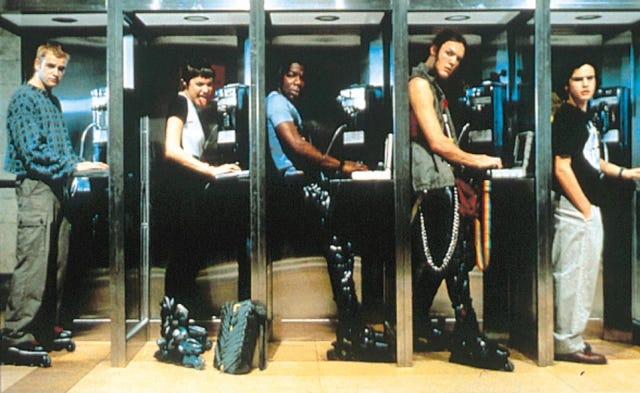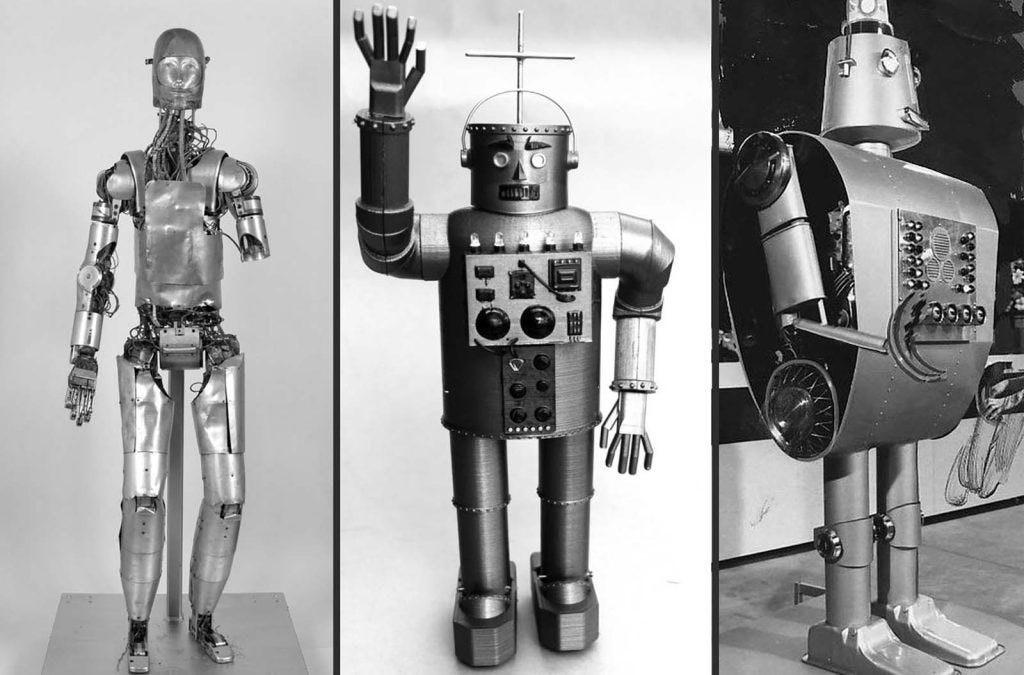Bots are actually...all around
the takeover of bots online - and what we as humans need to do about it
“so it looks like…yeah, possibly 49% of your followers are real.”
I was testing out a new social analytics platform a founder was building - and I started to panic.
“wait. so the rest of my followers could be bots?” I asked.
“it’s likely...” she trailed off as she clicked around to pull a few more numbers.
“but like…I haven’t bought any followers. ever. I’ve never run ads. I don’t get it.” I started to freak out that I looked like a complete fraud - like Instagram influencers who get caught buying followers - except I’m apparently so boring that bots just decided to follow me for free (it’s charity work, clearly…)
the founder laughed and explained that this more common than ever now.
“bots are everywhere.” she noted. “sometimes when I tag my location I notice I’ll get a few followers from that. most likely bot accounts.”
“ok, well…how do I fix this?” I asked.
“that’s the thing. there’s really nothing you can do about it.”
I left that meeting still feeling like a total scam artist. my immediate gut reaction was to curse Mark Zuckerberg (obviously) but it also sent me down a rabbit hole to understand what’s really going on right now.
if half of my followers are fake, then that means half of other people’s followers are fake, then…(insert woman doing math gif)…
are we even creating content for humans anymore?
why the internet feels exhausting now
for the second time in internet history, bots have outnumbered humans online.
that’s right - humans are now in the minority of internet “users”.
and sadly it’s much bigger than fake followers or spam comments. brands are spending billions of dollars advertising to people who…don’t exist.
while you might think of big brands and immediately celebrate their demise, keep in mind I’m also talking about the small business owner who is paying to run their first ad campaign - only to find that the 350 clicks they get translate into 0 visitors.
god forbid they take those results to heart without ever acknowledging that it was never going to be successful in the first place.
the dead internet theory isn’t so much of a theory now as it is a reality.
the evolution of bot behavior
when you think of bots right now, what comes to mind? maybe Russia. maybe hackers.
but that’s just the tip of the iceberg.
modern bots are more like an arranged marriage between non-US mafia and Silicon Valley.
the quickly escalating problem is really a symptom of two things:
1. cybercrime now being big business and
2. governments turning information into a weapon.
then layer on top of that arguably the biggest accelerator: generative AI + LLMs (think ChatGPT, Claude, etc.)
and you have the recipe for a bot-filled web.
most people think that bots are spam and they can spot them easily from things like:
generic “great post!” commentary
obviously generic usernames (user34209528i309523)
broken English
generic profile photos that look like they’re coming off of Google image search
but bots are smarter now. they might be the frequent skincare commenter in the beauty subreddit who’s convinced you to buy a $200 face cream. or the mom who’s obsessed with a certain stroller brand in the local moms FB group.
and as much as you might want to believe that you can spot them, there’s a higher likelihood every year that you can’t. a 2024 study from Notre Dame found that humans can’t spot bots 58% of the time. I even want to test my knowledge, but I’d imagine at this point my gut instinct would be off.
your brand is talking to itself
let’s get into more specifics to paint the picture of how insane this is:
X/Twitter: (I know I know) during the 2024 Super Bowl, cyber security firm CHEQ found that 76% of traffic from advertisers was fake. not low quality. not unengaged. not real! and brands paid millions to advertise there.
Instagram: it’s been leaked that on average, 40% of all activity on Instagram is artificial. so that means if you’re a brand signing a deal with an influencer, you’re partially paying for bots (and don’t blame the influencers here! many of them are ethical and haven’t bought followers)
ecomm: last holiday season was the tipping point - nearly 57% of all internet traffic to ecomm websites were bots, according to Radware.
gaming: when limited drops sell out in seconds, don’t always fall for the hype. we’re looking at 57% of traffic being bots.
there’s also one brand in recent memory who really took a bot beating.
in 2023, Zara came out with a campaign that had mannequins wrapped in white cloth. you might remember it as it drew tons of attention. many people believed the brand was taking a shot at Gaza conflict, and immediately started to call it out.
however the backlash was massively amplified by a bot network. 39% of all social profiles who engaged with the #boycottzara hashtag were found to be fake according to Cyabra. and on the peak day of the controversy, more bots engaged with the brand than real people.
Zara ended up pulling the campaign as a result of the backlash.
how to stop performing for bots
if you’re a marketer or a brand or even a creator, let’s just accept that your analytics are likely lying to you.
but if you want to go deeper, you can always look at the following:
geographic data (my founder friend pulled this for me and it was shocking)
session durations on websites (a lot of bots will visit but not stick around)
surge patterns for traffic, followers, etc. if you amass a following at a certain random time, there’s a high likelihood of those being bots
also bots aren’t going to do everything. if there’s a conversion on your site with real money spent, then that should be your KPI - not how much traffic you’re getting.
find ways to have quality interactions. if a customer DMs you with a question, maybe have a genuine conversation with them instead of just creating an automation that forces them to act like a robot too.
and this won’t come as as surprise but - build a real community. there’s a reason why human-led communities and private networks are becoming more and more popular right now. it helps bot-proof everything.
you are you, and that is your power
right now we’re speedrunning toward an internet of mostly bots. so much so that it’s been rumored multiple times that in 2026 almost 90% of the content on the internet will be AI generated (by a human or bot).
this is why one of my most popular videos has been on the two-tiered internet we’re about to experience. so much of that prediction was based on the acknowledgement of bots being everywhere.
if you’re a human (and a human reading this - hi!) then this is actually great news. because your competitive advantage is…well, being a human. and creating content as a human.
at some point I’ll write about human verification, but for now just know that showing up creating content as you is one of the biggest assets you can have. who knew?
take this as your permission slip to show up as you.
let’s also not forget that business used to be about building relationships. it’s like we’ve strayed so far from that that we’ve forgotten the why.
AI can go ahead and pummel the masses, but you can be part of the humans showing up online who truly prioritize 1-to-1.
and that’s going to be a superpower.
thanks for taking the time to read!
some things I’m up to:
building my Future-Proof workshop for C-suite/brand teams who want to stay ahead (DM me if you’re interested - more info coming soon!)
running my own private Slack community for female founders who want to show up on social
hosting a few incredible workshops with Bonfire in Burgundy, France in September for those who feel creatively burned out (come join us and hit the reset button!)
lmk in the comments - have you become more aware of bots on social media over the last few years? what’s your sign that’s a dead giveaway for them? tell me below!






Is social listening, as a business function, now just turning into a waste of time?